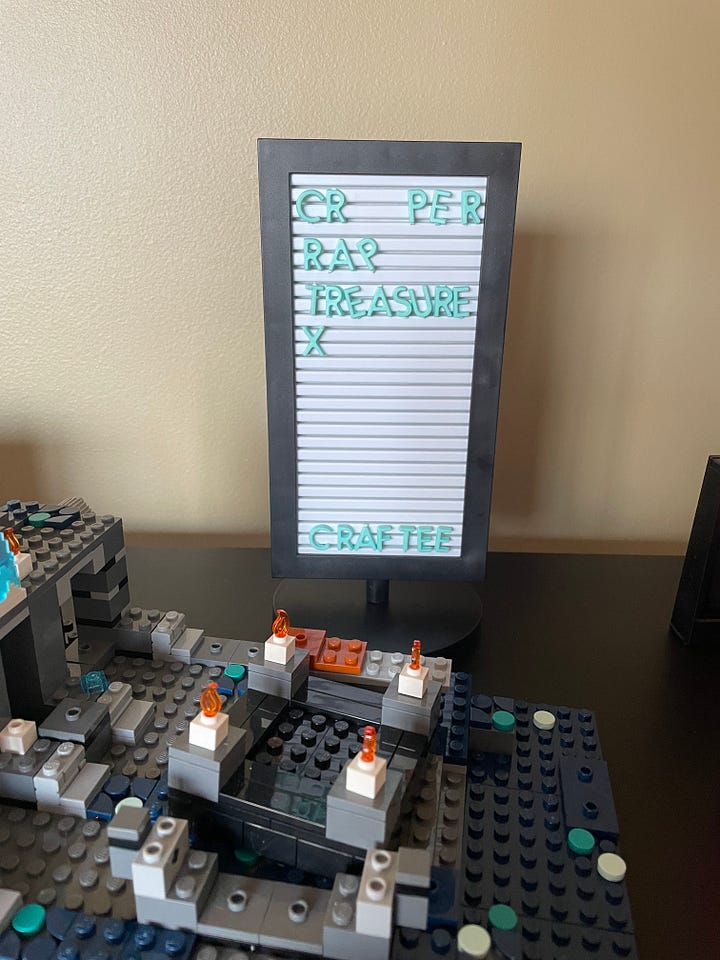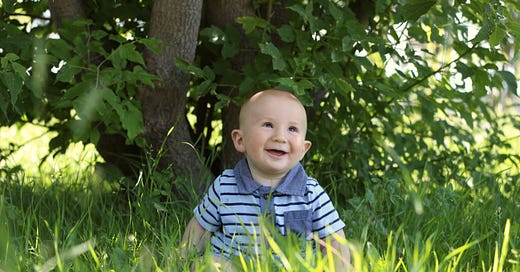Declan’s first two years of life was very challenging for me. Even as a newborn, he would not settle for anyone but me and, occasionally, Jason. He did not sleep through the night until after he turned two—and even then, it was still hit or miss. And his emotional outbursts and overwhelm from sensory stimulation meant we often had to leave places early for his sake. I’ve been joking (not joking) recently that I didn’t have birth trauma, I had first-two-years trauma. In that time, I found a lot of comfort through online communities of people who were seeking to parent in a more respectful way than they had experienced themselves, who were doing the hard work of deconstructing old narratives and replacing them with new ones that better served them and their family. I wrote a lot about my journey on Instagram, not so much to attract followers, but to work through my own stuff and be a voice of empathy in my tiny sphere of influence.
But one thing I’m finally seeing on the other side of his early days was how hard it felt to trust him, to trust myself, and to have faith that he would be okay.
I remember doubting our decisions so many times: Would he ever sleep well if we chose not to sleep train? Would he learn to do the right thing if we didn’t implement consequences (aka punishments)? Would he become malnourished if I didn’t make him eat his food? Would he show remorse if I never told him to apologize? Would he ever build the skills he needs if I simply modelled them without forcing him to follow suit? I’m pretty sure I’m not the only one asking myself these questions.
Recently, I was chatting with another mom at a playgroup, and she told me that she felt like she was doing all the right things, but struggling to see the fruit of her parenting. Later in the day, I sat and asked myself, What really are the ‘right’ things, and what is this fruit that we are looking for? Children who are quiet, obedient, and never do the wrong thing? Children that are polite, smart, and hit every milestone at the right time? Children that make us as parents look good? I wonder if the fear of our children being seen as too loud, too messy, aggressive, delayed, rude, and all those fun things makes us as caregivers hold the reins a little too tight. It’s hard to shut out the noise that says we should be doing something else, something better, because our society can’t hold space for children’s humanness. But in my experience, what children need isn’t more control and direction—they need us to have enough compassion, for ourselves as well as them, to see past what ‘should be’ to nurture ‘what is.’
This journey of choosing trust over control has felt harder the more Declan moves through the world without me, especially as more expectations have been heaped on his shoulders with each passing year. So much of me wants to protect him from failure and hurt, while also recognizing that my influence only goes so far. An area that has felt really difficult for me is his speech.
He was a fairly early speaker; by 18 months old, he could count to five and speak in basic sentences. But as he reached 3, 4, and now 5, we started to realize that he wasn’t forming his words as clearly as was expected. Many people, including me and Jason, couldn’t understand a good chunk of what he was saying, especially when he got on a tangent. Some days, shame really wanted to eat me up: How could I fail him? If I am so good at working with children, why is my own child behind in this way? What am I doing wrong?
The thing about shame is that it makes me feel like I need to hustle for my worthiness and correct course quickly, lest someone judge me. I’ve often felt the need to defend myself when the topic came up, worried that others would perceive me as a less competent mother, not to mention ECE. And with that worry came the tendency to try to force him to practice his sounds even when it upset him, to constantly correct him when he spoke, and to become more frustrated when my tactics weren’t working.
The only antidote to shame that I know is self-compassion; yet, it is a tough practice during really challenging moments, especially when it comes to the children we love and our roles as caregivers. I don’t know how many times I’ve needed to speak gently into the shame spiral, to remind myself that Covid started when Declan was two, a crucial age in language acquisition—cartoons in excess seemed a better option than burning out and losing my s***. Not only that, but people weren’t gathering and were wearing masks, making it difficult for him to see word formation from a variety of folks.
But mostly, I needed to trust that it’s okay for him to struggle with something, that his struggle does not define his worth as my child or my value as a parent/caregiver. I needed to be okay with our shared humanity. Neither of us are perfect, and we will both struggle. And yet…I can still choose to trust: trust that we can make the next right decision in the face of difficult choices and circumstances; trust that we’re both doing our best, no matter what that looks like in each given moment; and trust that we will both be okay.


He’s come a long way, and he’s actually a very gifted communicator, not in spite of his struggles but because of them—he’s gained some other skills through this process, like being able to describe something in different ways when we didn’t understand the first time, or persevering to learn the different sounds even when it felt hard, or working through frustration during difficult communication. Letting go of what I thought should be and embracing what was allowed me the space to start getting Declan help with his speech and trust that we would figure it out together.
Do you think the children you love are a good or bad example of your caregiving skills? Why is that?
Do you find it hard to ignore the noise and discover what it is children really need in moments of struggle?
What would it look like to choose trust today?








I think one of my fears with sending my oldest to pre-k this year definitely has to do with the fact that we're expanding our bubble and therefore will be more open to judgements about her behaviour and our parenting. I'm not sure I've really thought about it so directly until now.
When we met with my daughter's teacher today, I let her know that Sybi stims a lot, because I wanted to make sure that no one(or at least no adults) would make her feel weird about it. The teacher has a background in special education and said she would just consider it to be a way that she expresses herself, which I love. It helped me relax a bit to see that she was so well received and that she enjoyed herself so much.